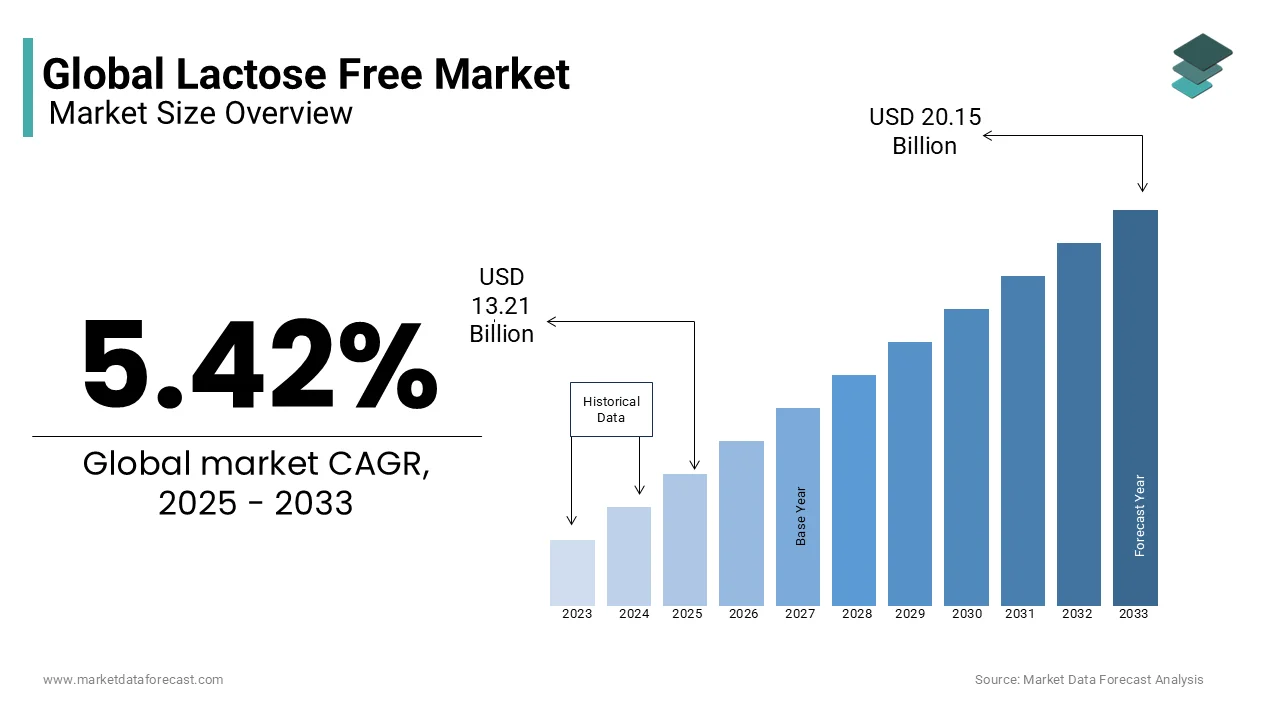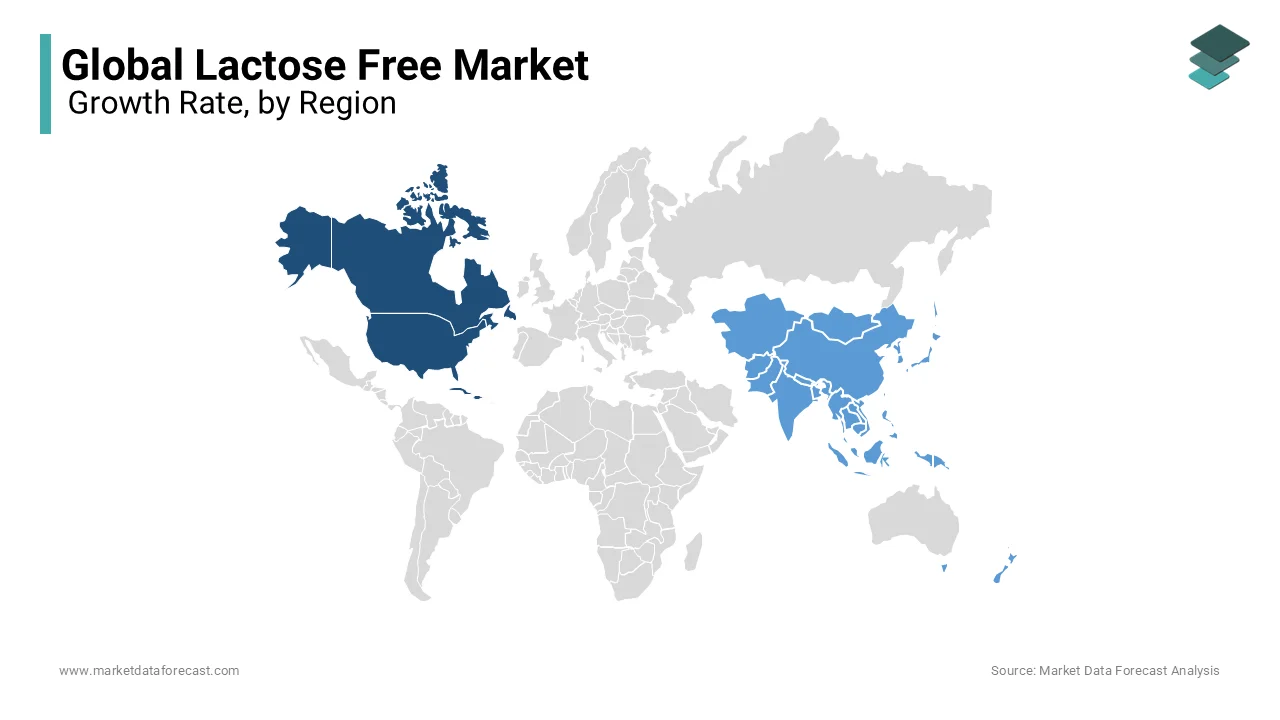Global Lactose Free Market Size, Share, Trends & Growth Forecast Report - Segmented By Type (Milk, Cheese, Yogurt, Ice-Cream, Others food), Distribution Channel, and Region (North America, Europe, Asia Pacific, Latin America, Middle east and Africa) – Industry Analysis (2025 to 2033)
Global Lactose Free Market Size
The global Lactose Free market size was valued to be USD 12.53 billion in 2024 and is anticipated to be worth USD 20.15 billion by 2033 from USD 13.21 billion in 2025, growing at a CAGR of 5.42% during the forecast period

Lactose free formulas are rapidly emerging as more and more people seek the nutritional value of milk in their daily diet. Food allergies can be life-threatening, but effective treatments are still lacking in the medical environment. As per the evaluations by the Centers for Disease Control and Prevention, food allergies affect almost 6% of children in the USA. Due to the global pandemic lactose intolerance levels are losing the market as a key part of modern protein-rich diets. As health awareness increases, the Lactose free food market is building a strong foundation and tapping into the lactose-intolerant consumer base. Lactose intolerance is a condition in which the human body fails to digest lactose available in milk. Lactose free foods are suitable for people with lactose intolerance, are easy to process, and show enhanced bioavailability. These products are formulated with reduced or Lactose free content to provide nutritional benefits without adverse reactions for the body.
Lactose free represents a third of the total dairy market, which is expected to lead this segment significantly over the foreseen period, especially due to the increasing number of consumers suffering from lactose intolerance in North America and Europe.
MARKET DRIVERS
The main growth engine of the world market for Lactose free products is the increase in the consumption of organic food and beverages. Other factors driving the expansion of the global market for Lactose free dairy products are the increase in cases of lactose intolerance and the increase in per capita spending on dairy products in both developed and emerging nations. The global market for Lactose free butter is experiencing significant growth due to the development of the global processed food industry, increased consumption of Lactose free butter and other dairy products due to aging populations, and urbanization. In addition, increasing some cases related to food allergies in other products that contain lactose is an important factor that affects the growth of this market. The easy digestibility factor and improvements in the bioavailability of Lactose free products also contribute to the expansion of this market. The main propellant on the world market without lactose implies an increase in the incidence of lactose intolerance since milk sugar cannot be digested among consumers. This is boosting demand for Lactose free foods across the globe. Furthermore, the increase in food allergies due to lactose-containing products has a great impact on this market. As consumer awareness of the health benefits associated with Lactose free foods increases, it is expected to lead the market for Lactose free foods in the forecast period. The increase in lactose intolerance patients is one of the main drivers of market growth. In the United States, the lactose intolerance cases are increasing, supporting the need for Lactose free foods.
Market growth is fueled by the growing population of lactose-intolerant newborns as the number of working women worldwide increases. It has been observed that there are a mounting number of newborns who cannot digest sugar levels. As the need for alternative products increases to meet the nutritional needs of the population, companies must enter this market. Some consumers prefer these products because they are healthier than normal products, while others consume them to avoid allergies or other health-related problems. Factors such as the introduction of Lactose free ice cream and other products will accelerate the growth of the Lactose free food market in the coming years. Lactose free drinks are also gaining space and popularity in the Lactose free food market share, and there will be high demand during the forecast period. It also increases the prevalence of diabetes, obesity, and other health problems. Increased energy demand through weight control, and growing consumer preferences for sugar-free, Lactose free, and gluten-free flour are some of the key factors expected to increase demand for Lactose free butter and drive growth in the global market for Lactose free foods. To stay competitive in the marketplace, vendors are developing and researching unprecedented Lactose free foods. Emerging countries like Mexico, Argentina and India are expected to offer great opportunities for Lactose free markets in the future.
MARKET RESTRAINTS
However, fierce competition with dairy substitutes like grains and nuts hinders this market. Dairy products are sensitive to dairy proteins, as well as lactose, which is due to the proliferation of consumers who avoid dairy products. Lack of knowledge of the benefits of Lactose free dairy products in developing countries and higher costs than conventional products are supposed to hamper this market growth.
REPORT COVERAGE
|
REPORT METRIC |
DETAILS |
|
Market Size Available |
2024 to 2033 |
|
Base Year |
2024 |
|
Forecast Period |
2025 to 2033 |
|
CAGR |
5.42% |
|
Segments Covered |
By Type, Distribution Channel And Region |
|
Various Analyses Covered |
Global, Regional and Country Level Analysis; Segment-Level Analysis; DROC; PESTLE Analysis; Porter’s Five Forces Analysis; Competitive Landscape; Analyst Overview of Investment Opportunities |
|
Regions Covered |
North America, Europe, APAC, Latin America, Middle East & Africa |
|
Market Leaders Profiled |
Nestlé, Nutricia, Valio Oy, Abbott, GIMME THE GOOD STUFF, Silverville, Apta Advice, Danone, Nurture, Inc. |
SEGMENTAL ANALYSIS
By Type Insights

REGIONAL ANALYSIS
North America is presumed to play a significant role in the Lactose free dairy market in the coming years. Depending on the region, the global Lactose free dairy market can be classified in Europe, North America, the Middle East and Africa, Asia Pacific, and Latin America. This is because the demand for cream and yogurt-based products is increasing, and the demand for organic foods is increasing.

The Asia Pacific region is likely to show good growth in the Lactose free dairy market over the outlook period. This is because per capita spending related to dairy products increases. China, the most populous economy, says that 92% of the population tends to be lactose intolerant. Similarly, 50% of people in India, the second-most populous economy, are lactose intolerant. Since dairy is an inevitable component of modern foods, it cannot be eradicated and only replaced, so the market demand for APAC Lactose free food is reinforced by established patterns of dairy intake. India is one of the largest milk producers, and the growing vegan population in the APAC region is shifting the trafficking of dairy products to Lactose free food markets produced by indigenous milk production. The UK is projected to see a slowdown in growth rates due to the additional demand for dairy substitutes.
KEY MARKET PLAYERS
Key players in the global Lactose free market are Nestlé, Nutricia, Valio Oy, Abbott, GIMME THE GOOD STUFF, Silverville, Apta Advice, Danone, Nurture, Inc.
RECENT HAPPENINGS IN THE MARKET
- In 2016 Valio Oy launched more than 100 Lactose free products in 50 countries. The company has invested around $ 28 million in the development of new products to provide customers with a high-quality guarantee.
- In 2017, Arla is the world's largest producer of organic dairy and alternative dairy producers without lactose. It uses several digital marketing strategies to witness exponential growth.
MARKET SEGMENTATION
This research report on the global Lactose free Market has been segmented and sub-segmented based on Type, Distribution Channel, and Region.
By Type
-
Milk
-
Cheese
-
Yogurt
-
Ice-Cream
-
Other Food
By Distribution Channel
-
Retail & Supermarkets
-
Online Platform
By Region
-
North America
-
Europe
-
The Asia Pacific
-
Latin America
-
The Middle East and Africa
Frequently Asked Questions
1.What are lactose-free products?
Lactose-free products are food and beverage items that have had the lactose removed or significantly reduced. Lactose is a type of sugar found in milk and dairy products, and individuals with lactose intolerance have difficulty digesting it. Lactose-free products provide an alternative for those who experience discomfort or digestive issues after consuming dairy.
2.What types of lactose-free products are available?
Lactose-free products come in various forms, including milk, yogurt, cheese, ice cream, butter, and even specialty items like lactose-free chocolate and baked goods. These products are often made using lactase enzymes to break down lactose, making them easier to digest for individuals with lactose intolerance.
3.What is driving the growth of the lactose-free market?
The lactose-free market is experiencing growth due to several factors, including an increasing awareness of lactose intolerance and dairy-related digestive issues, rising demand for dairy alternatives among lactose-intolerant individuals, and the growing popularity of plant-based diets. Additionally, advancements in food technology have led to the development of innovative lactose-free products that closely mimic the taste and texture of traditional dairy items.
Related Reports
Access the study in MULTIPLE FORMATS
Purchase options starting from $ 2500
Didn’t find what you’re looking for?
TALK TO OUR ANALYST TEAM
Need something within your budget?
NO WORRIES! WE GOT YOU COVERED!
Call us on: +1 888 702 9696 (U.S Toll Free)
Write to us: [email protected]